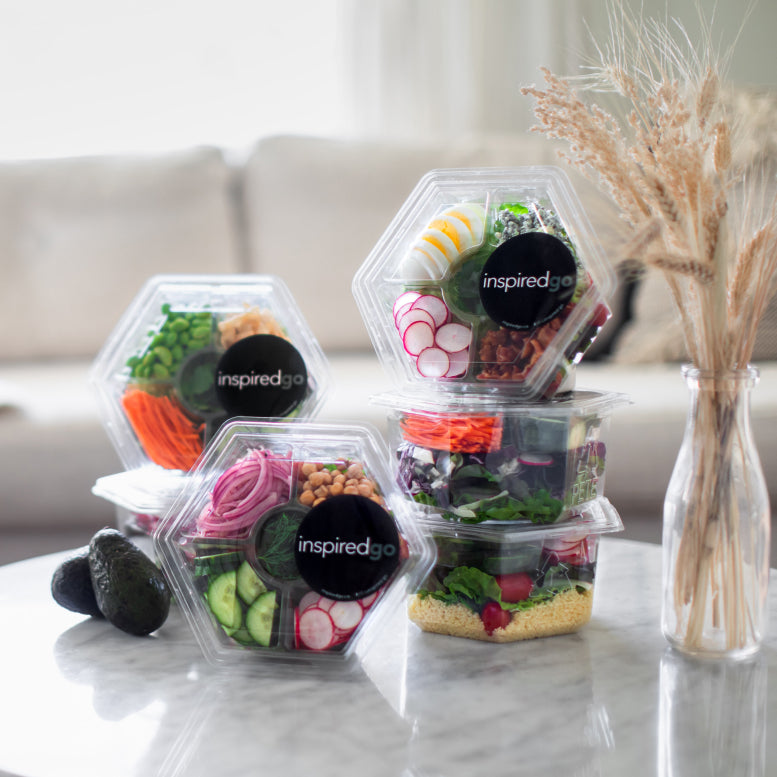What Are The Best Vegan Substitutes For Meat?
Table of Contents
1. Exploring Plant-Based Alternatives to Meat
2. Is Being Vegan Healthier for You?
3. Why Are Vegan Meal Delivery Services Convenient?
4. How Does Inspired Go Make Vegan Eating Healthier?
1. Exploring Plant-Based Alternatives to Meat
Seitan, also known as wheat meat, replicates the texture of meat impressively and can be used in stir-fry dishes, sandwiches, and more. Mushrooms, particularly portobellos, offer a meaty texture and earthy flavor, making them an excellent choice for grilling or roasting. Jackfruit, when cooked, has a texture similar to shredded meat and is commonly used in vegan tacos, sandwiches, and curries. Lastly, legumes like lentils, chickpeas, and beans are not only high in protein but also provide a satisfying, hearty element to meals. These plant-based substitutes allow for a wide range of flavorful, nutritious, and satisfying meals that align with a vegan lifestyle.
Order fresh salads today →


2. Is Being Vegan Healthier for You?
A well-balanced vegan diet is often associated with significant health benefits, including lower cholesterol levels, reduced risk of heart disease, and improved digestion. Plant-based diets are naturally high in fiber, antioxidants, and essential vitamins while being lower in unhealthy fats and processed sugars. However, the healthiness of a vegan diet depends on balanced meal planning to include critical nutrients such as vitamin B12, iron, and omega-3 fatty acids. Vegan meal delivery services help bridge these gaps by offering carefully crafted meals that prioritize nutritional completeness. By taking the guesswork out of meal prep, these services make it easier for customers to experience the health benefits of veganism without worrying about deficiencies or imbalanced nutrition.
Choose your salads and schedule delivery →
3. Why Are Vegan Meal Delivery Services Convenient?
Vegan meal delivery services eliminate many of the common challenges associated with plant-based eating, such as sourcing specialty ingredients, meal prep time, and recipe planning. Customers can simply select meals from an online menu and have them delivered directly to their homes. Pre-portioned servings remove the guesswork from meal preparation and reduce food waste. Additionally, clear nutritional labeling makes it easy to track macros and calories. For busy professionals or those new to veganism, these services offer a seamless way to maintain a plant-based diet without hassle. With flexible delivery schedules and diverse menu options, vegan meal delivery provides unmatched convenience for healthy eating.
Get fresh salads and snacks delivered →
4. How Does Inspired Go Make Vegan Eating Healthier?
At Inspired Go, nutrition is at the core of every meal, ensuring that customers get the right balance of macronutrients and essential vitamins in every bite. Their vegan dishes include protein-packed legumes, fiber-rich vegetables, and healthy fats, eliminating the common pitfalls of nutritionally imbalanced vegan meals. Unlike some plant-based convenience foods, Inspired Go avoids highly processed ingredients, focusing instead on whole, nutrient-dense options. Each meal is carefully crafted by dietitians and chefs, ensuring that customers receive the necessary nutrients for energy, well-being, and long-term health. With detailed nutritional labeling and transparent meal planning, Inspired Go makes healthy vegan eating effortless.
Try our fresh, ready-to-eat salads →
Frequently Asked Questions
The key difference between vegan and vegetarian diets lies in the exclusion of animal products. Vegetarians avoid meat, poultry, and fish but may consume animal-derived products like eggs, dairy, or honey. Vegans, on the other hand, exclude all animal products, focusing solely on plant-based foods. Veganism is often a lifestyle choice, avoiding animal products in all forms, including clothing and cosmetics.
A vegan diet consists entirely of plant-based foods, including fruits, vegetables, grains, nuts, seeds, and legumes. It excludes all animal-derived products, such as meat, fish, dairy, and eggs. This diet emphasizes nutrient-dense, whole foods, though processed vegan alternatives are available. A vegan diet, when well-balanced, supports good health and environmental sustainability, making it popular for ethical, health, and ecological reasons.
Not all vegan diets are gluten-free. While veganism excludes animal products, gluten is a protein found in wheat, barley, and rye, which are plant-based and commonly included in vegan meals. To maintain a vegan and gluten-free diet, focus on naturally gluten-free foods like fruits, vegetables, rice, quinoa, and gluten-free grains. Always check labels for hidden gluten in processed vegan foods.
On a vegan diet, you can enjoy a wide variety of plant-based foods, including fruits, vegetables, legumes, nuts, seeds, whole grains, and plant-based dairy alternatives. Popular vegan dishes include stir-fries, salads, grain bowls, soups, and curries. Incorporating fortified foods or supplements ensures you meet nutrient needs like B12, iron, and omega-3s, making the diet balanced and enjoyable.
A vegan diet can be very healthy when balanced and diverse. It’s rich in fiber, vitamins, and antioxidants, while being lower in saturated fat and cholesterol. These factors contribute to better heart health, weight management, and reduced risk of chronic diseases. However, careful planning is essential to ensure adequate intake of nutrients like vitamin B12, iron, and protein for overall health.

